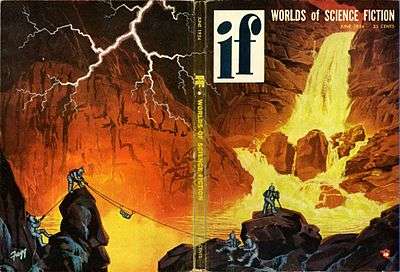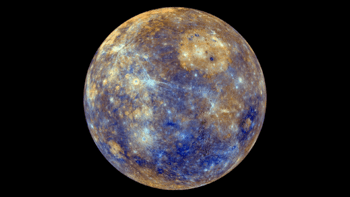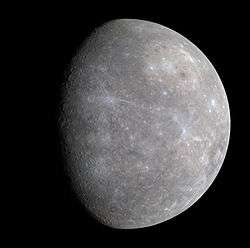Mercury in fiction

The planet Mercury has often been used as a setting in science fiction. Recurring themes include the dangers of being exposed to solar radiation and the possibility of escaping excessive radiation by staying within the planet's slow-moving terminator (the boundary between day and night). Another recurring theme is autocratic governments, perhaps because of an association of Mercury with hot-temperedness.
Mercury was believed at first to be tidally locked to the Sun, orbiting with one face permanently turned toward it and another face turned away, allowing for extremes of heat and cold on the same planet and possibly a narrow belt of habitable land between the two. This concept of Mercury was disproven in 1965, when radio astronomers discovered that Mercury rotates three times for every two revolutions, exposing all of its surface to the Sun.
Fictional works about Mercury can thus be divided into two groups; those, mostly written before 1965, featuring the "Old" Mercury with its light and dark sides, and those that reflect more recent scientific knowledge of the planet.
Literature
"Old Mercury"

- In Eric Rücker Eddison's The Worm Ouroboros (1922), the action takes place in a fantasy world that is ostensibly part of the planet Mercury. However, the name is used purely for its exotic value, and there is no attempt to make the characteristics of the world correspond to any facts known or believed about Mercury in the 1920s. Eddison's Mercury resembles Earth in all respects except in details of geography: it has a normal day-cycle, a moon, and a calendar identical to Earth's.
- Tama of the Light Country (1930), Tama, Princess of Mercury (1931) and Aerita of the Light Country (1941) by Ray Cummings are Burroughsian adventures on a tidally-locked Mercury.
- The planet is briefly mentioned in H. P. Lovecraft's "The Shadow Out of Time" (1936):
- Later, as the Earth's span closed, the transferred minds (of the Great Race of Yith) would again migrate through time and space — to another stopping place in the bodies of the bulbous vegetable entities of Mercury.
- In Leigh Brackett's short stories (especially "The Demons of Darkside" (1941), "A World Is Born" (1941), "Cube from Space" (1942), and "Shannach – the Last" (1952)), a tidally locked Mercury features a 'Twilight Belt' exposed to dangerous variations in heat and cold and havoc-wreaking solar storms. Some of Brackett's most colorful characters, like Jaffa Storm ("Shadow Over Mars") and Eric John Stark, were Mercury-born.
- Mercury is a setting in several of Isaac Asimov's stories, all written before astronomers knew that the planet was not tidally locked; in each story, Mercury has a permanent day-side and night-side.
- "Runaround" (Astounding Science Fiction, 1942, later published in the 1950 collection I, Robot) involves a robot specially designed to cope with the intense solar radiation on the planet.
- "The Dying Night" (The Magazine of Fantasy and Science Fiction, 1956) is a murder mystery in which the suspects are astronomers from Mercury, the Moon, and the asteroid Ceres. The dynamics and living conditions of each of these locations are key to discovering which astronomer is guilty.
- Lucky Starr and the Big Sun of Mercury (1956) is a juvenile novel, the fourth in the Lucky Starr series.
- In C. S. Lewis's novel That Hideous Strength (1945), Mercury, or Viritrilbia, is described as being the birthplace of language in the universe, possibly due to Mercury's association with wisdom. It is by the power of the Oyarsa of Viritrilbia, who is based on the god Mercury or Hermes that Merlinus Ambrosius is enabled to "unmake language" at the N.I.C.E. banquet in the penultimate chapter.
- In Arthur C. Clarke's Islands in the Sky (1952), there is a description of a strange creature that lives on what was then believed to be the permanently dark nightside with only occasional visits to the twilight zone.
- In Hal Clement's Iceworld (1953), the silicon-based aliens establish a base on the hot side of the planet. This is not hot enough for them, so they put the base in the middle of a crater with mirrors on the bank to concentrate sunlight to get the necessary temperature.
- Erik Van Lhin's Battle on Mercury (1953) – Erik van Lhin was one of the pen names of Lester del Rey.
- In "The Weather on Mercury" by William Morrison, a group searches for a missing explorer in the twilight zone of a Mercury with native life.
- Alan E. Nourse's short story "Brightside Crossing" (Galaxy, 1956) is narrated by the only survivor of four men who attempt the ultimate sporting feat of crossing Mercury's sun-facing hemisphere at perihelion (when Mercury is closest to the sun).
- The Kurt Vonnegut novel The Sirens of Titan (1959) is in part set in caves on a tidally locked Mercury, home to peculiar animals known as harmoniums that cling to the walls of the caves and derive their energy from vibrations in the rock.
- In Gordon R. Dickson's Necromancer (1962), a base was located on Mercury, used by the Chantry Guild for training beginners in the group.
- In Larry Niven's "The Coldest Place" (1964), an early short story, Niven teases the reader, who is told that the scene is "the coldest place in the Solar System" and assumes it to be Pluto — only to discover in the end that the actual location is the dark side of Mercury. Though written when Mercury was believed to be tidally locked, the story was published just after the planet was found to rotate in a 2:3 resonance.
- Hugh Walters' Mission to Mercury (1965) also assumes Mercury to have a 'dark' side at near absolute zero from which the protagonists must be rescued before they freeze to death.
- In Valeddom by Robert Gibson (2013) the traditional Twilight Belt version of Mercury is found to be still true - the 1965 'disproof' a deception.[1]
"New Mercury"

- In Arthur C. Clarke's Rendezvous with Rama (1973), Mercury is ruled by a hot-tempered government of metal miners that threatens to destroy the alien spacecraft Rama. The novel shares its background of a colonized Solar System with several others, especially Imperial Earth.
- In David Brin's Sundiver (1980), the characters spend most of the time in Mercury, between expeditions into the Sun's chromosphere.
- In Kim Stanley Robinson's novels and short stories, especially The Memory of Whiteness (1985), "Mercurial" (in The Planet on the Table, 1986), Blue Mars (1996), and 2312, Mercury is the home of a vast city called Terminator, populated by large numbers of artists and musicians. To avoid the dangerous solar radiation, the city rolls around the planet's equator on tracks, keeping pace with the planet's rotation so that the Sun never rises fully above the horizon. The motive power comes from solar heat expanding the rails on the day side. The city's rulers are called the Lions of Mercury.
- In Warren Ellis' and Darick Robertson's Transmetropolitan (1997–2002), a cyberpunk comic book series, Mercury is said to be covered with solar panels, to aid in the power needs of a technologically advanced Earth.
- In Grant Morrison's DC One Million (1998), each planet of the solar system is overseen by one member of the future descendants of the Justice League. Mercury is overseen by the Flash of the 853rd century, perhaps as it is associated with the fastest of the Gods.
- Ben Bova's Mercury (2005; part of his Grand Tour series) is about the human drama of the exploration of Mercury: why people might be interested in going there (for instance, to harness the intense solar energy that close to the sun), and what challenges there would be.
- In Stephen Baxter's Manifold: Space (2000), Mercury is the final stronghold of humanity after successive waves of extraterrestrial colonizers exterminate the human race from the rest of the solar system. It is the site of the human victory against a race of beings known as the Crackers, who seek to dismantle Sol to exploit its energy.
- In the Larklight Trilogy by Philip Reeve Mercury is uninhabited. However it once had an interplanetary empire, and lived on an Earth Lost Continent, before they left the Solar System on a large ship. Apparently they were humanoid, but at least some had golden eyes.
- In Charles Stross's book Saturn's Children, Mercury resembles Kim Stanley Robinson's, with a city on rails called Terminator.
- Mark Anson's novel Below Mercury[2] is a science fiction thriller set in the abandoned workings of Erebus Mine, an ice mining and refining facility in the depths of Chao Meng-fu crater, on the South Pole of Mercury.
- In Karl Schroeder's 2014 novel Lockstep, set over 14,000 years in the future, Mercury no longer exists, having been used as the raw material to create a Dyson cloud used to power starship launches and posthuman technology.
Film and television
The planet has also been a setting for several television series:
- In the Space Patrol episode "The Fires of Mercury", Professor Heggarty's device for translating the language of ants also converts heat waves into radio waves. Maria realizes that this might provide a way of transmitting warmth from Mercury to the Colony on Pluto, where freezing conditions worsen as the dwarf planet nears the point in its orbit farthest from the Sun.
- In a Star Trek: Voyager show-within-a-show, The Adventures of Captain Proton (first appearing in "Night" in 1998), Dr. Chaotica was a villain who wanted to conquer the people of Earth and force them to work in the mines of Mercury.
- In the animated television series Exosquad (1993–1995), Mercury served as Exofleet's temporary base during the reconquest of the Homeworlds (Venus, Earth, and Mars).
- An episode of Futurama had Mercury's circumference faithfully represented by a "road sign" giving distance to the only vehicle service station on the planet, where Fry and Amy are stuck when her vehicle runs out of fuel.
- In the television show Invader Zim (2001), Mercury is turned into a prototype giant spaceship by the extinct Martians. In the episode "Battle of the Planets", Zim (piloting Mars, also made into a spaceship) and Dib (piloting Mercury) battle each other while flying through the solar system. In the end of the episode, Zim foolishly flies Mars into the Asteroid Belt, almost killing Zim, with Mars flying wildly out of control and nearly hitting Blorch, a fictional planet outside the solar system.
- In the 2007 film Sunshine the Icarus II spacecraft goes into orbit around Mercury to rendezvous with the thought-lost Icarus I.
- The short lived British TV sitcom Kinvig featured a female, human-like alien from Mercury who was living in a fictional town in England.
- In Sailor Moon, Sailor Mercury is Mercury's protector. Her attacks are water and ice-based.
- In the Syfy made-for-television film Collision Earth, a solar flare knocks Mercury out of its orbit and sends it on a collision course with Earth.[3]
Games and comics
- The Buck Rogers comic strip included a Sunday story line "Attacked by Mercurians" (1/31/32 to 8/7/32), in which Buddy Deering of Earth and Alura Princess of Mars help in the battle between The Kollanians - inhabitants of the eternally frozen hemisphere - and The Odlannians - of the blazing Desert hemisphere, and they create a moon for Mercury.[4] A later story line has them "Exploring the Water Moon of Mercury" (1/13/35 to 3/17/35).
- In the Transhuman Space roleplaying books by Steve Jackson Games, Mercury is used for production of antimatter and the mining of metals.
- Levels 6 and 7 of the computer game Descent take place in installations on Mercury. Level 7 marks the end of the shareware version of the game as well as the game's first boss battle.
- In Destiny (game), Mercury is terraformed by the Vex and it is the home to the Trials of Osiris.
- In Descent³, the player has to escort a covert cargo ship into and out of a spacecraft factory in Mercury while it steals core components for the construction of a new ship. The player risks solar radiation damage to his own ship (which is not as shielded as the cargo ship) if he flies out in the open atmosphere.
- In the Mutant Chronicles role-playing game, Mercury is the home to the mighty Mishima corporation. However unlike the other planets Mercury was not fully Terraformed and so the population have to live in vast domed Cities. (This is stated in the First Series Sourcebook - Mishima)
- The game Starsiege includes Mercury as the setting for several of its missions.
- In the 1992 PC game Star Control II, Mercury is one of the sources of radioactive metals needed for the first mission of the game.
- In Marvel Comics's Guardians of the Galaxy title, Nicholette "Nikki" Gold is the last survivor of a colony on Mercury in the 31st century after the Badoon invaded the Solar System. Like all Mercury colonists she has great resistance to heat and can project it.
- In Charlton Comics's title Space Adventures, a super-hero from Mercury, appropriately named "Mercury Man", was seen in two 1962 issues.
- In the Japanese Manga and Anime Series Sailor Moon released in 1992, in the Silver Millennium (which is believed to be at least 1-2 million years before the events to both the manga and anime) Mercury was inhabited, but the people of Mercury could only inhabit the far side of the planet as, due to the heat of the side facing the sun, the side facing the sun is uninhabitable. Ami Mizuno also known as Sailor Mercury is the planets guardian, and all her attacks are all based on either water and ice.
- In All-Star Comics #13 the JSA are gassed by Nazis and rocketed to different planets. Johnny is headed directly at the planet Mercury and only the Thunderbolt keeps Johnny from roasting alive inside. Once on the planet, Johnny encounters a giant spider, is knocked silly and taken prisoner and put into a cage. Thunderbolt saves him again, this time from a giant ant-eater, and saves the giant spiders from it as well. Johnny is rewarded with an Occelerator, a device that can be used to get information out of people.
- In February 1952, in a ruse designed to fool the highly secretive Crime Czar, Superman builds a robot called Krag—supposedly a super-powered alien from Mercury—and has Krag announce his intention to become the "King of Crime." After staging the defeat of Superman, Krag is invited to meet with the Crime Czar. Subsequently, Krag brings the Crime Czar to jail and Superman reveals his deception (Act No. 165: "The Man Who Conquered Superman!").
- Bill Watterson's comic strip Calvin and Hobbes included a story extended across several daily strips, in which Calvin and his classmate Susie must give a presentation about Mercury to their class. Calvin's contribution is typically replete with creative liberties:
| “ | The planet Mercury was named after a Roman god with winged feet. Mercury was the god of flowers and bouquets, which is why today he is a registered trademark of FTD florists. Why they named a planet after this guy, I can't imagine. | ” |
See also
- Crematoria, a fictional Planet of the Riddick Media Franchise.
- List of real astronomical locations in fiction
References
- ↑ Valeddom - Mercury Awaits published by Netherworld Books, imprint of Mirador, Langport, Somerset, 2013
- ↑ Anson, Mark. Below Mercury. Glenn Field Publishing, 2011. ISBN 978-0-9568898-0-5
- ↑ http://www.imdb.com/title/tt1887703/
- ↑ Buck Rogers in the 25th Century: The Complete Newspaper Sundays, Volume One 1930 - 1933, page 114
